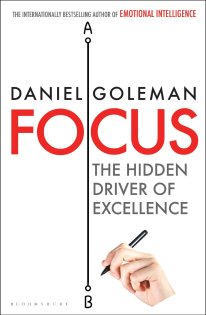Emotional Intelligence by Daniel Goleman was a book I have always been meaning to read after having heard rave reviews. During a trip to the Blossoms bookstore in Bangalore however, I was only able to find Social Intelligence and Focus, two of Goleman’s other titles. Since Malcolm Gladwell made famous the 10,000 hour rule in The Outliers, I have been a fan of the particular genre of science writing dealing with human psychology.My particular interest in the subject also stems from my quest to understand the confluence between the Islamic tradition and study of the human psyche.
One of the first books I read on the subject was Contemplation by Dr. Malik Badri, an eminent psychologist who has authored many books and articles about Islam and Psychology. Modern psychology tends to apply a more reductive approach to understanding human behavior vis a vis stimuli and response based on chemical interactions. But I personally prefer a balance between the material and spiritual in understanding why humans behave the way they do and more importantly in bringing about positive societal change.
I digress though, which is something I tend to do a lot. I have also come to the painful realization that I’m too distracted. A seemingly first world problem but the constant deluge of information is something the modern society has to deal with as one of the side effects of a hyper connected world. As mobile devices get more ubiquitous, multiple notifications are constantly trying to grab our attention and the overwhelming streams of information are overloading our brain circuits and affecting how we deal with people and responsibilities. Add to that the age, at which children are introduced to internet devices getting gradually lower, it is of little wonder that experts fear an impoverishment of attention.
While Goleman talks about these phenomena in his book on Focus, the book itself seems to lack focus. Don’t get me wrong. I liked the writing which is a good mix of anecdotes, hard research and statistics along with relevant case studies that prevent the book from becoming too dry. Goleman does tend to talk about the various parts of the brain responsible for various functions a lot and I would prefer a diagram of sorts to keep the names in memory. No harm done however, the casual reader would sparsely remember the names of brain parts because it is the inferences that are more important.
That’s where the book lacks in focus. It starts out well by trying to explain how two distinct portions of the brain (the top down and the bottom brain) are responsible for regulating attention. Goleman tries to explain the value of allowing the brain to wander as a prerequisite for creativity and serendipitous connections. At the same time he explains how the control of the attention muscle so to say, helps improve how we approach and handle tasks. The book then goes into understanding of self-awareness as an important aspect of self-control and how emotions can affect what we focus on.
But as the book progresses, the connection between the theme of Focus with the topics of discussion becomes less apparent. There is chapter on systems thinking which is peppered with evidence of Goleman’s left leaning with his talk on environmentalism and quotes by Jeffrey Sachs. I personally fancy myself as systems thinker yet did not find anything of particular value in the chapter and observations on brain function that could help me be better at it. Social and Emotional intelligence becomes the highlight when talking about leadership skills and becoming a better leader. The issue of focus seems to be an afterthought. While taking up business cases I have to admit I was looking hard for how the theme of focus fit in.
I would recommend the book for the first few chapters which provide valuable information on understanding the ‘Anatomy of Attention’ as Goleman puts it, along with training yourself in improving self-awareness. Some of the inferences on improving mindfulness are especially important for parents training their children to be less impulsive and more measured. The chapters on mindfulness can also be looked at in the light of Khushu’u (mindfulness) a very important aspect of salah or ritual prayers of muslims.
Overall the book is a bit disappointing considering what I was looking for in terms of managing attention in the age of distraction

